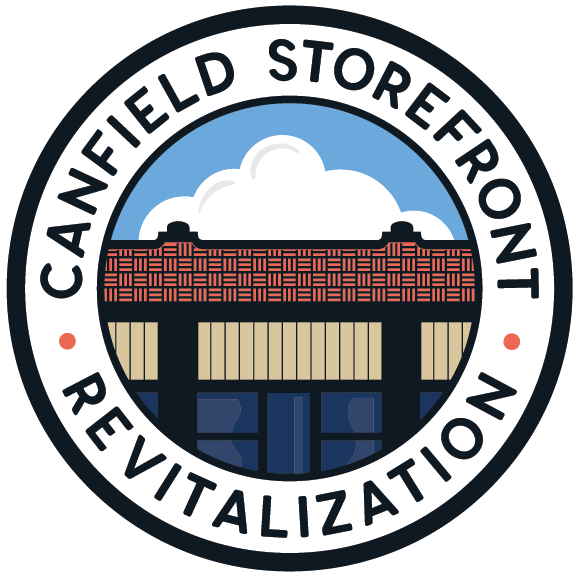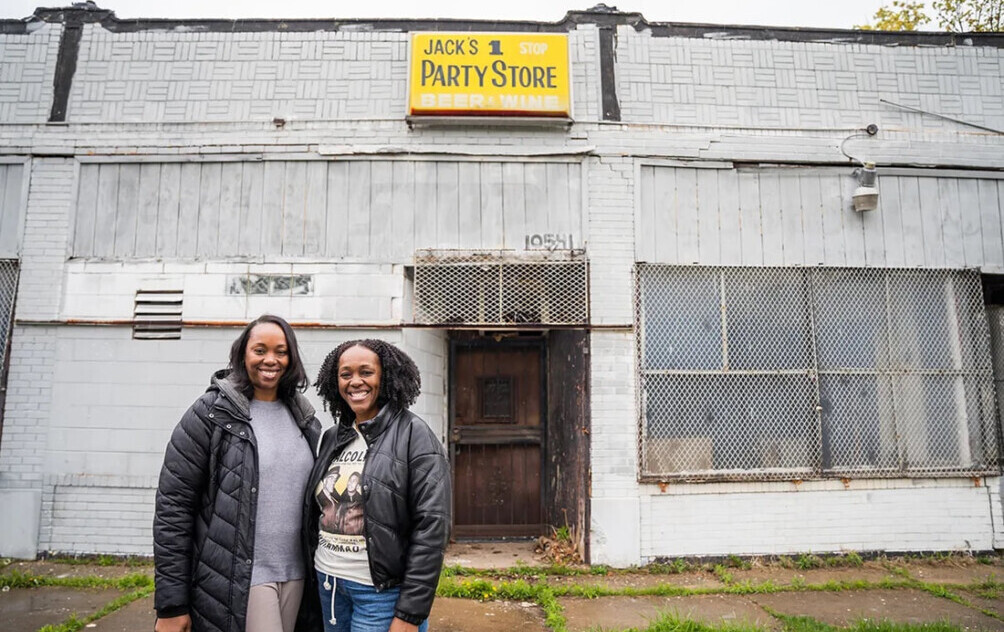Growing up in the 1980s, Detroit sisters Kim and Rhonda Theus remember walking to Jack’s party store to buy penny candy. The building on East Canfield Street also housed a record store, barbershop, dry cleaner, and a salon. “It was a hub for the neighborhood,” Kim said, until the 1990s when Jack died and, around the same time, people began to leave the neighborhood. “As the neighborhood depopulated, there was less business and all the businesses shuttered,” she said, except for one man who still cuts hair out of the building.
They plan to turn it into a coffee shop, mini art gallery, and a gathering spot for neighbors.
“Really something for the community,” said Kim, adding that what goes into each of the units could change based on community input.
The sisters said neighbors often say they wish Jack’s was still there, or that the building was being used for something. “Many people still refer to it as Jack’s,” Kim added.
This isn’t the first community improvement venture for the Theus sisters. Together, Kim and Rhonda founded the nonprofit Canfield Consortium in 2015, which leads various neighborhood revitalization efforts. In the past, the nonprofit transformed an overgrown vacant lot into a community space with a pavilion, planted trees, created two flower gardens, and the East Canfield Art Park which features a rotating display of local artists’ work.
This year, the sisters are also working to open an innovation hub in a house off Canfield that they purchased from the land bank. The hub will provide community internet access as well as other tools like tax assistance, mental health wellness services, and will host community dinners.
“The Innovation Hub will be for providing a space where people can come to have fun, you don’t have to spend money, you don’t really have to be a member, but it’s just really respecting people and the community,” Kim said.
“As little as 30 years ago, this was a very self-sustaining neighborhood,” Rhonda said. “We grew up here–everything we needed was in the neighborhood, and now due to all the disinvestment and the depopulation and neglect we have to go outside of the neighborhood.”
The vacancy rate in the East Canfield neighborhood, 41%, is more than 1.5 times that of the City of Detroit, and nearly half of the neighborhood’s residents live below the poverty line, according to U.S. Census Bureau data.
When the sisters were growing up they could walk two blocks to the city’s Brewer Recreation Center, which had a boxing ring, auditorium, gymnasium, and kitchen. But in 2006, it closed. Now, there isn’t a single city-run recreation and community center in District 4. Rhonda said neighbors have to drive to get to a city recreation center.
“There used to be movie theaters on Mack, grocery stores, things like that,” Kim said, which have been replaced by a few party stores. The coffee shop and community center in the former Jack’s space won’t just be a business to make money, she said. “It is about making sure that the needs of residents are met.”
East Canfield is near a large section of neighborhoods that the city’s Parks and Recreation Department has identified as lacking access to recreation centers and plans to create one in the Chandler Park neighborhood.
Darnell Gardner, 64, still lives in his childhood home and used to get his haircut at Jack’s when he was 7 years old.
Gardner said it’s “amazing” that the sisters are renovating Jack’s, after it sat vacant for so long.
“They created a start for our community to grow,” Gardner said of the sisters’ work in the neighborhood that has created such an impact. “And the coffee shop is a place that I will definitely be getting my coffee from.
“They are the heartbeat of this neighborhood,” he said. “I’m just so happy and proud of the work that they’ve done.”
In February, Motor City Match announced Canfield Consortium as a recipient of $75,000 for the coffee shop. The Motor City Match award was the second for the nonprofit. The group got its first grant in 2019 for $46,500 to work with an architect on the design and rehab of the building.
Motor City Match, a partnership between the city, the Detroit Economic Growth Corp. and the U.S. Department of Housing and Urban Development, helps entrepreneurs develop their businesses. The program has awarded $11.6 million in grants since its founding in 2015.
Kim said it feels great to be a two-time awardee of the program.
“We feel like the city is really seeing our vision and there needs to be more buy-in, in neighborhoods,” she said. “Everyone knows about the investment that’s happening downtown, Midtown, and Corktown, but you have so many other amazing neighborhoods in the city that need love.They need these third spaces, safe spaces that people can go to, to build community.”
“Third spaces” are places where people can meet and spend time that aren’t workplaces or homes and include churches, cafes, libraries, or gyms.
Bethany Howard grew up down the street from Jack’s and visited with other neighborhood kids to buy pizza and Snapple drinks.
“It was always a good space,” said Howard, who still lives in the same home. “That was part of our childhood, going to the store. We’d be walking up the street with napkins and forks eating that folded pizza.”
Howard said she’s excited for the space to be in use again and hopes to see continued community engagement from Canfield Consortium happen both online and in person.
Rhonda said that a lot of the neighbors there are like her and Kim, and have had their homes passed down from family members. Although they could move to a nicer neighborhood, she said, they stay.
“We stay here because we deserve to have a good, self-sustaining premier neighborhood. So that’s why we are doing this investment in not only the building and in the neighborhood, but the people,” she said.
“If you build it, they will come,” she said. “So we are confident that once this gets rehabbed and activated, it’s just going to be an incredible hub again for the neighborhood.”
Sisters to revive former neighborhood hub on East Canfield
Growing up in the 1980s, Detroit sisters Kim and Rhonda Theus remember walking to Jack’s party store to buy penny candy. The building on East Canfield Street also housed a record store, barbershop, dry cleaner, and a
Detroit sisters return to childhood home to restore neighborhood
“I feel like tearing down blighted structures sounds like a good idea, but who wants to live in a neighborhood where there’s nothing left?” asked Kim. “Success is building on that empty land so that every piece
Urban Acupuncture Revitalizes Detroit Alleyways
Rhonda Theus reminisces fondly of her youth growing up in Detroit’s East Canfield Village neighborhood, where get-togethers with extended family and close neighbors along her block on Montclair Street included barbecues, mingling, and relaxing in the alley




